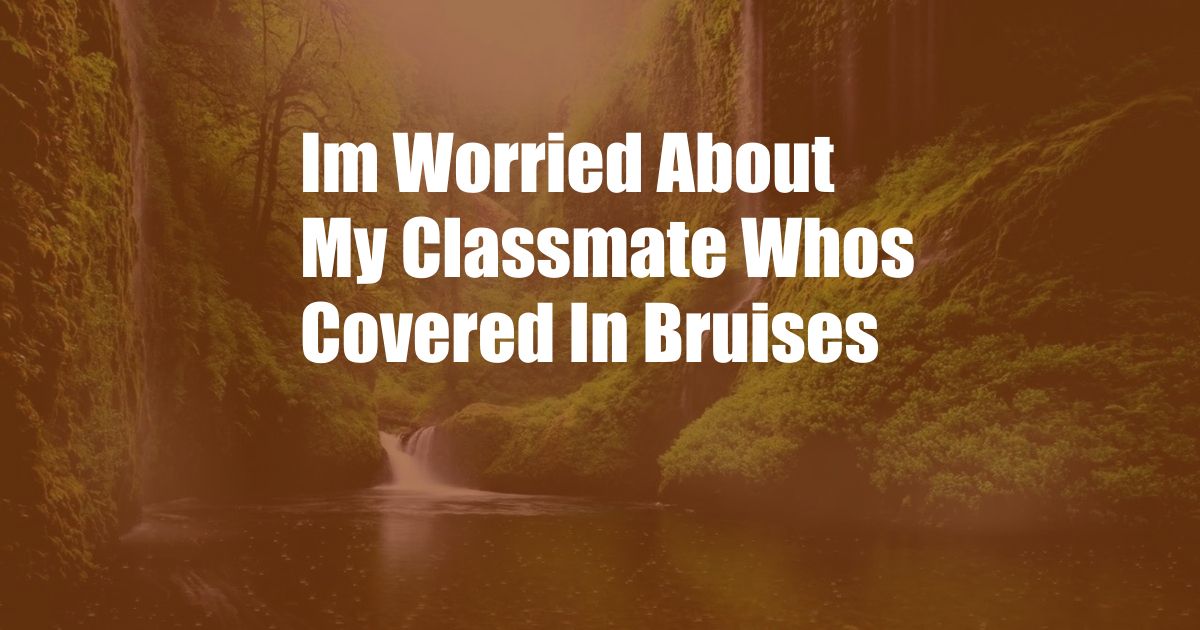
I’m Worried About My Classmate Who’s Covered in Bruises
Have you ever been in a situation where you noticed a classmate or friend covered in bruises and suspected something was wrong? It can be a very distressing experience, especially if the person in question is hesitant to talk about it. My friend, Sarah, found herself in a similar situation, and she was torn between respecting her classmate’s privacy and reporting her suspicions of abuse.
In this blog post, we’ll delve into the topic of spotting the signs of abuse and the importance of reporting it. We’ll also provide tips and expert advice on how to approach the situation with sensitivity and support.
Recognizing the Signs of Abuse
Abuse can take many forms, including physical, emotional, sexual, and neglect. It’s important to be aware of the signs of abuse, so you can intervene if necessary. Some common signs include:
- Physical: bruises, cuts, burns, broken bones, sprains, and dislocations
- Emotional: withdrawal from friends and family, sudden changes in behavior, depression, anxiety, and low self-esteem
- Sexual: inappropriate touching, sexual abuse, or exploitation
- Neglect: lack of food, clothing, shelter, or medical care
Reporting Abuse: It’s Your Responsibility
If you suspect that a child or vulnerable adult is being abused, it’s your responsibility to report it to the authorities. Reporting abuse can be difficult, but it’s the right thing to do. There are several ways to report abuse, including:
- Calling the National Child Abuse Hotline at 1-800-4-A-Child (1-800-422-4453)
- Contacting your local child protective services agency
- Telling a trusted adult, such as a teacher, guidance counselor, or school principal
Tips for Approaching the Situation
Approaching the situation with sensitivity and support is crucial. Here are a few tips:
- Choose the right time and place: Talk to the person in private, where you won’t be interrupted.
- Be gentle and compassionate: Let the person know that you’re concerned about them and that you’re there to help.
- Avoid being judgmental: It’s important to remember that the person may be feeling ashamed or guilty.
- Listen to their story: Let the person tell their story in their own words, without interrupting.
- Offer support and resources: Let the person know that you’re there for them and that there are resources available to help.
Expert Advice on Reporting Abuse
If you’re not sure whether or not to report abuse, it’s always best to err on the side of caution. Here’s some expert advice:
- Trust your instincts: If you suspect abuse, don’t ignore it.
- Don’t wait for proof: You don’t need to have definitive proof of abuse to report it.
- Don’t confront the abuser: It’s dangerous to confront an abuser. Let the authorities handle it.
- Document your observations: If possible, document the signs of abuse (e.g., take pictures of bruises) and keep a record of your interactions with the person.
FAQ on Reporting Abuse
Q: What if the person denies being abused?
A: It’s important to respect the person’s decision, but you can still report your suspicions to the authorities. They can investigate the situation and determine if abuse is occurring.
Q: What if I’m afraid of retaliation?
A: You can report abuse anonymously. You can also contact a trusted adult, such as a teacher, guidance counselor, or school principal, for support.
Q: What happens after I report abuse?
A: The authorities will investigate the situation and determine if abuse is occurring. If abuse is confirmed, the abuser may be arrested and the victim may be given support and protection.
Conclusion
Spotting the signs of abuse and reporting it is a crucial way to protect children and vulnerable adults. By following the tips and advice provided in this article, you can help to make a difference in someone’s life. If you have any questions or concerns about abuse, please don’t hesitate to seek help.
Are you interested in reading more about child abuse prevention? Comment below to let us know!